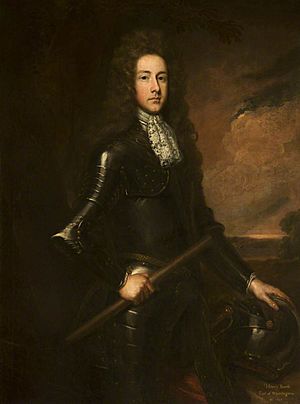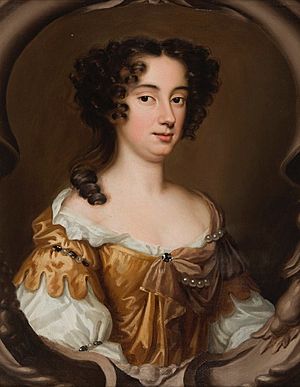Henry Booth, 1st Earl of Warrington facts for kids
Quick facts for kids
The Earl of Warrington
|
|
|---|---|
 |
|
| Chancellor of the Exchequer | |
| In office 1689–1690 |
|
| Preceded by | Sir John Ernle |
| Succeeded by | Richard Hampden |
| Member of the English Parliament for Cheshire |
|
| In office 1678–1685 Serving with Thomas Cholmondeley, Sir Philip Egerton & Sir Robert Cotton
|
|
| Preceded by |
|
| Succeeded by |
|
| Personal details | |
| Born | 13 January 1652 |
| Died | 2 January 1694 (aged 41) |
| Spouse | Mary Langham |
| Children | George Booth, 2nd Earl of Warrington |
| Parents |
|
Henry Booth, 1st Earl of Warrington (born January 13, 1652 – died January 2, 1694) was an important English politician. He served as a Member of Parliament, a Privy Councillor, and even the Chancellor of the Exchequer. He played a key role in the Revolution of 1688. He was also the Mayor of Chester and a writer.
Contents
Henry Booth's Life and Career
Early Life and Family
Henry Booth was the son of George Booth, 1st Baron Delamer, and Lady Elizabeth Grey. His family was well-connected. His grandparents included Henry Grey, 1st Earl of Stamford.
In 1670, Henry Booth married Mary Langham. She was the daughter of Sir James Langham, a well-known figure.
A Voice in Parliament
Henry Booth became a Member of Parliament for Cheshire. He served in this role several times between 1678 and 1681. During his time in Parliament, he was known for disagreeing with the policies that favored Catholics. He believed strongly in Protestant rights.
Facing Challenges
In 1685, Henry Booth faced a serious accusation. He was accused of being involved in the Monmouth Rebellion. This was a time when some people tried to overthrow King James II.
Booth was put on trial for treason in the House of Lords. However, his defense team was successful. He was found not guilty and was set free.
Role in the Glorious Revolution
The Revolution of 1688 was a major event in English history. It led to King James II being replaced by William of Orange. Henry Booth strongly supported William of Orange.
He even gathered an army in Cheshire to help William. After William became King William III, he recognized Booth's loyalty. In 1689, William made Booth the chancellor of the exchequer. This was a very important job, managing the country's money.
Later Life and Achievements
Henry Booth was also a writer. He wrote several political essays. These were published after his death in a book called The Works of the Right Honourable Henry, Late L. Delamer, and Earl of Warrington. He also wrote in support of his friend, Lord Russel.
In 1690, he was given the title of Earl of Warrington. This was a high honor. In 1691, he became the Mayor of Chester. He passed away on January 2, 1694.
Family Life
Henry Booth and his wife, Mary Langham, had five children who grew up:
- Elizabeth (died 1697)
- Mary (1674–1741), who married Russell Robartes. She was the mother of Henry Robartes, 3rd Earl of Radnor.
- George Booth, 2nd Earl of Warrington (1675–1758)
- Langham Booth (1684–1724), who also became a Member of Parliament.
- Henry Booth (1687–1726)
See also
- Earl of Warrington
- List of deserters from James II to William of Orange
 | Charles R. Drew |
 | Benjamin Banneker |
 | Jane C. Wright |
 | Roger Arliner Young |


